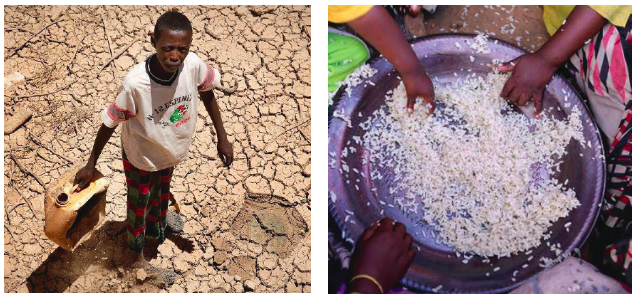Foreign Aid Cuts Approved By Congress
If the recent deep cuts proposed by President Trump are approved by Congress coupled with no contribution in aid by the U.S., experts fear that the African continent’s drought and famine could trigger far-ranging consequences for the migrant situation in Europe and could possibly create readily available soldiers for Islamic extremist groups.
The world’s largest humanitarian crisis in 70 years has been declared in three African countries on the brink of famine, just as President Trump’s proposed foreign aid cuts threaten to pull the United States from its historic role as the world’s top emergency donor.
Conflicts raging in Nigeria, Somalia and South Sudan, along with the rising hunger crises, have resulted in an increase in severe famine conditions among all three regions simultaneously. Nearly 16 million people in the three countries are at risk of dying within months.
Famine has already been declared in two counties of South Sudan and one million people there are on the brink of dying from lack of food, U.N. officials have said. Somalia has declared a state of emergency over drought and 2.9 million of its people face a food crisis that could become a famine, according to the U.N. In northeastern Nigeria, severe malnutrition is widespread in areas affected by violence from Boko Haram extremists.
“We are facing the largest humanitarian crisis since the creation of the United Nations,” Stephen O’Brien, the U.N. humanitarian chief, told the U.N. Security Council after a visit to Somalia and South Sudan.
Trump’s proposed budget would cut programs that help some of the most vulnerable people on Earth, Mick Mulvaney, the president’s budget director, told reporters. He added, “The budget would spend less money on people overseas and more money on people back home.”
At least $4.4 billion was needed by the end of March to avert a hunger catastrophe in Nigeria, Somalia, South Sudan and Yemen, U.N. Secretary-General Antonio Guterres said in late February. But according to U.N. data, only 10 percent of the necessary funds have been received so far.
The United States traditionally has been the largest donor to the U.N. and gives more foreign aid to Africa than any other continent. That kind of funding is expected to be reduced under Trump’s proposed budget, according to former and current U.S. government officials.
“I [have] never seen this kind of threat to what otherwise has been a bipartisan consensus that food and humanitarian assistance programs are morally essential and critical to our security,” said Steven Feldstein, a former deputy assistant secretary of state in the Obama administration.
Meanwhile, neighboring African countries will feel the immediate consequences of famine, experts said. The U.N. refugee chief said Uganda was at a breaking point after more than 570,000 South Sudanese refugees arrived since July alone. Others fleeing hunger aim for Europe instead.
South Sudan has been entrenched in civil war since late 2013 that has killed tens of thousands and that has prevented widespread cultivation of food. In Nigeria and Somalia, extremist groups like Boko Haram and al-Shabab have proven stubborn to defeat. Both Islamic organizations still hold territory that complicates aid efforts.




